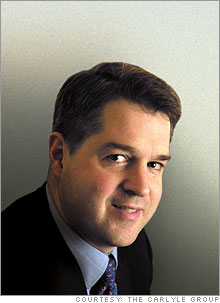Carlyle goes back to school in ChinaThe private equity shop is betting big on the business of teaching English to China's burgeoning middle class, writes Fortune's Matthew Boyle.(Fortune Magazine) -- When the hordes of spectators, dignitaries, corporate sponsors, and other assorted visitors descend on Beijing next summer for the Olympic Games, some might be surprised to discover how many locals speak good English. They might be even more surprised to learn that the man who has played a key role in bringing English to the Chinese masses is a bald Italian who once hawked encyclopedias for a living, is fond of quoting ancient Taoist philosophers, and exchanges holiday cards with Michael Dell.
Luigi Tiziano Peccenini is the founder of Wall Street Institute, a Baltimore-based chain of English-language training centers around the world that is majority owned by the Carlyle Group. The private equity giant bought the $60 million firm in 2005, believing that the institute could one day be a billion-dollar operation. "We don't see a business like this every day," says Brooke Coburn, co-head of Carlyle's U.S. venture capital arm, who led the buyout. (Carlyle brought Citigroup (Charts, Fortune 500) into the deal as a minority investor after closing.) Peccenini was 32 years-old, living in Italy, and studying German when inspiration struck in 1972. Sitting in a classroom and watching a teacher write on a blackboard was not only incredibly boring, he thought, but hardly the best way to learn a new language. So he took a different approach with Wall Street Institute -- the name, recommended by a friend in advertising, is somewhat of a misnomer -- by combining lectures with one-on-one training and lab work. Peccenini, who created training programs for IBM's massive mainframes in the 1960s, also incorporated multimedia technology into the school's curriculum. Throughout the 1970s and 1980s, the school expanded in Europe and Central America. Then, in 1997, Peccenini sold the business to Sylvan Learning Systems for $26 million. Peccenini left the company and Sylvan, now called Laureate Education (Charts) and newly private, paid little attention to its new property and the business stagnated for the next decade. Then Carlyle came along. "It was the proverbial restaurant outside the casino," says Coburn of the institute's neglect. "The business really needed investment, and there was a lot to like." Coburn isn't kidding. With English skills commanding a premium in today's global economy, analysts estimate that language training centers are a $50 billion annual business that's growing about 30 percent a year. To meet demand, thousands of language schools have emerged in Asia and Europe. Problem is, it's a highly fragmented business so there's no dominant player. Wall Street Institute, which caters to high-income professionals, is one of the better-known outfits, with more than 350 sites in 26 countries. Carlyle is betting that the school's future is in China, where a population explosion and red-hot economy is fueling demand for English skills -- especially among the middle class. It's said that an English-speaking worker in Beijing can double her salary. Peccenini entered the market in 2000, and while he was not the first to offer English training, his eccentric personality helped make Wall Street Institute a well-known brand (locals call it Wall Street English). Students pay about $3,000 for a year of classes, which is steep and significantly higher than the $2,000 the institute charges in other countries. But it's a price that the country's upwardly mobile young professionals are willing to pay. With some 50,000 Chinese students enrolled at 26 locations and about 1,000 more signing up each month, the company's China operations generate about $50 million a year in revenues, or roughly one-third of its sales. Even so, Wall Street Institute isn't the country's biggest language school. Beijing-based New Oriental (Charts), whose stock price has doubled since its IPO last year, has more than a million registered students. Carlyle is hoping to catch up fast. Plans call for the school to open as many as 12 new Wall Street Institute locations annually over the next several years. The private equity shop sees dollar signs in the corporate market -- and not just in China. About 15 percent of the school's worldwide revenues come from corporate clients like Google (Charts, Fortune 500) and KPMG, which are hiring locals in far-flung overseas offices and don't mind paying top dollar to train workers. Tim Daniels, Wall Street Institute's CEO, wants corporations to account for half of company revenues in five years (either through organic growth or acquisitions). He predicts that corporate demand for English language education could one day rival signups by individuals, who have long been the industry's bread and butter. Peccenini, for one, plans to sit out Wall Street Institute's next phase. While Daniels focuses on the business, he's looking to settle down in Beijing and study Mandarin, his eighth foreign language. But it's not like he'll need it when the Olympics come to town. |
Sponsors
|

